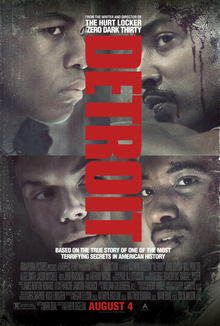****
July, 1967. As racial riots in the city of Detroit reach breaking point, the police and National Guard surround the Algiers Motel, believing a sniper to be situated there. At the end of the night, three black men were dead and nine others had been brutally assaulted.
When it comes to a film such as Detroit, the phrase 'I enjoyed it' seems hideously misjudged - how it is possible to 'enjoy' a film wherein three innocent black men are murdered in cold blood? Instead of the word 'enjoy' then, I suggest 'admire' - and I definitely do admire Kathryn Bigelow's study into what happened that fatal night in 1967. Interjecting dramatized scenes with newsreel footage and black and white images from the time itself, Bigelow instantly fixes the viewer in 1967 and the context of the period. Instead of leaping straight into the drama of the Algiers Hotel itself, Bigelow takes the time to introduce us to the tension of the moment, showing a police raid on a private party and the violence that subsequently occurs - it's a wise choice, and we are instantly made aware of the taut, knife-edge situation. When the sequence at the Algiers Motel does begin, it's clear that violence is inevitable (we have already seen an officer gun down a black man in the street), but that doesn't make the brutality any less shocking. Three young, ill-advised and power-crazy police officers (fronted by a illuminous Will Poulter) arrive on the scene, and horror ensues. At times I looked away, I definitely jumped more than once and I looked on with disgust as Poulter threatened each innocent man and woman with hideousness. It was certainly a nail-biter at times, but more of an emotionally draining experience than a thriller.
For all that is excellent about Detroit, however, some factors of the film were undoubtedly problematic. For a start, it is way too long. Divided into three clear parts - the set-up, the incident, and the fall-out - we are slowly guided from A to B without a great sense of urgency. Without a doubt, some of this film could have been left on the cutting room floor, including the side line story about The Dramatics which, whilst tragic, was not required to cement how long-lasting and deeply affecting the occurrence at the motel was. Similarly, the section within the motel itself is too baggy - I quickly found myself becoming disinterested in various groups of people being pulled from room to room and threatened, which meant that the moments of violence that came later in the sequence did not shock me as they might have. Arguably, the time we spend in the Algiers could well reflect the long night for the victims, whilst the repeated movements from room to room speak volumes for the inability of the police officers, but the taut, tense nature of the set-up was ebbing away by the conclusion of the sequence. Finally, the court room drama of the final act seems altogether 'tacked on' - I couldn't help but feel that the film would have worked better as either the hostage situation, or legal battle, but it certainly feels awkward as both together. For me, I think there would have been a tighter, more poignant ending if the screen had gone back at the end of the Algiers narrative.
Brutal, unflinching and unnervingly timely, Detroit is an important study into cruelty, institutionalised racism and the corruption that power brings. Admirably led by a searing performance by Will Poulter, this hard-hitting drama is certainly not an easy watch, but it is a vital one. Not entirely perfect, it nonetheless remains a damning indictment of racism and segregation.

Comments
Post a Comment